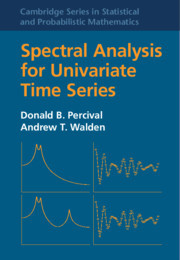Description
Spectral Analysis for Univariate Time Series
Cambridge Series in Statistical and Probabilistic Mathematics Series
Authors: Percival Donald B., Walden Andrew T.
Focuses on practical application of spectral analysis of time series, with examples from environmental, engineering and physical sciences.
Language: English
Approximative price 107.80 €
In Print (Delivery period: 14 days).
Add to cart
Publication date: 03-2020
780 p. · 18.2x25.9 cm · Hardback
780 p. · 18.2x25.9 cm · Hardback
Description
/li>Contents
/li>Biography
/li>
Spectral analysis is widely used to interpret time series collected in diverse areas. This book covers the statistical theory behind spectral analysis and provides data analysts with the tools needed to transition theory into practice. Actual time series from oceanography, metrology, atmospheric science and other areas are used in running examples throughout, to allow clear comparison of how the various methods address questions of interest. All major nonparametric and parametric spectral analysis techniques are discussed, with emphasis on the multitaper method, both in its original formulation involving Slepian tapers and in a popular alternative using sinusoidal tapers. The authors take a unified approach to quantifying the bandwidth of different nonparametric spectral estimates. An extensive set of exercises allows readers to test their understanding of theory and practical analysis. The time series used as examples and R language code for recreating the analyses of the series are available from the book's website.
1. Introduction to spectral analysis; 2. Stationary stochastic processes; 3. Deterministic spectral analysis; 4. Foundations for stochastic spectral analysis; 5. Linear time-invariant filters; 6. Periodogram and other direct spectral estimators; 7. Lag window estimators; 8. Combining direct spectral estimators; 9. Parametric spectral estimators; 10. Harmonic analysis; 11. Simulation of time series.
Donald B. Percival is the author of 75 publications in refereed journals on a variety of topics, including analysis of environmental time series, characterization of instability of atomic clocks and forecasting inundation of coastal communities due to trans-oceanic tsunamis. He is the co-author (with Andrew Walden) of Spectral Analysis for Physical Applications: Multitaper and Conventional Univariate Techniques (Cambridge, 1993) and Wavelet Methods for Time Series Analysis (Cambridge, 2000). He has taught graduate-level courses on time series analysis, spectral analysis and wavelets for over thirty years at the University of Washington.
Andrew T. Walden has authored 100 refereed papers in scientific areas including statistics, signal processing, geophysics, astrophysics and neuroscience, with an emphasis on spectral analysis and time series methodology. He worked in geophysical exploration research before joining Imperial College London. He is co-author (with Donald B. Percival) of Spectral Analysis for Physical Applications: Multitaper and Conventional Univariate Techniques (Cambridge,1993) and Wavelet Methods for Time Series Analysis (Cambridge, 2000). He has taught many courses including time series, spectral analysis, geophysical data analysis, applied probability and graphical modelling, primarily at Imperial College London, and also at the University of Washington.
Andrew T. Walden has authored 100 refereed papers in scientific areas including statistics, signal processing, geophysics, astrophysics and neuroscience, with an emphasis on spectral analysis and time series methodology. He worked in geophysical exploration research before joining Imperial College London. He is co-author (with Donald B. Percival) of Spectral Analysis for Physical Applications: Multitaper and Conventional Univariate Techniques (Cambridge,1993) and Wavelet Methods for Time Series Analysis (Cambridge, 2000). He has taught many courses including time series, spectral analysis, geophysical data analysis, applied probability and graphical modelling, primarily at Imperial College London, and also at the University of Washington.
© 2024 LAVOISIER S.A.S.




